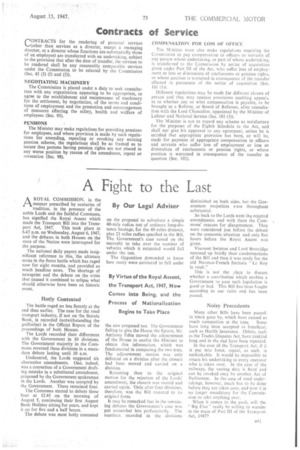A Fight to the Last
Page 51

If you've noticed an error in this article please click here to report it so we can fix it.
By Our Legal Adviser AROYAL COMMISSION, in the manner prescribed by centuries of tradition, in the presence of the noble Lords and the faithful Commons, has signified the Royal Assent which made the Transport Bill into the Trans port Act, 1947. This took place at 6.45 p.m. on Wednesday, August 6, 1947, and the debates in both Houses on the state of the Nation were interrupted for the purpose,
The national daily papers made insignificant teference to this, the ultimate scene in the fierce battle which has raged now for eight months, and provided so much headline news. The shortage of newsprint and the debate on the crisis that caused it combined to eclipse what should otherwise have been an historic event.
Hotly Contested '
The battle raged no less fiercely at the end than earlier. The ease for the road transport industry, if not on the Statute Rook, is recorded (notwithstanding the guillotine) in the Official Report of the proceedings of both Houses.
The Lords recorded their differences with the Government in 10 divisions. The Government majority in the Commons reversed these divisions in a marathon debate lasting until 10 a.m.
Undaunted, the Lords suggested six alternative amendments. One, indeed, was a correction of a Government drafting mistake in a substituted amendment, proposed by the Government spokesman in the Lords. Another was accepted by the Government. There remained four.
The Commons started to debate these four at 12.45 on the morning of August 5, continuing their first August Bank Holiday sitting for years, and kept it up for five and a half hours..
The debate was most hotly contested
on the proposal to substitute a simple 40-mile radius test of ordinary long-distance haulage, for the 40 miles distance, plus 25 miles radius specified in the Bill. The Government's case rested on the necessity to take over the number of vehicles which it estimated would fall under the test.
The Opposition demanded to know how many were estimated to fall under the new proposed test. The Government failing to give the House the figures, Mr. Anthony Eden moved the adjournment of the House to enable the Minister to obtain this information, which was fundamental in comparing the two tests. The adjournment motion was only defeated on a division after the closure had been moved and carried on a division.
Returning then to the original motion for the rejection of the Lords' amendment, the closure was moved and carried again. Only after four divisions, therefore, was the Rill restored to its original form.
It may be remarked that in the remaining debates the Government's case was put somewhat less perfunctorily. The numbers recorded in the divisions diminished on both sides, but the Government majorities v:ere throughout substantial.
So back to the Lords went the rejected amendments, and with them the Commons' reasons for disagreement. They were considered just before the debate on the economic situation and only five hours before the Royal Assent was given.
Viscount Swinton and Lord Beveridge summed up briefly their condemnations of the Bill and then it was ready for the old Norman-French formula "Le Roy le veult."
This is not the Mee to discuss whether a constitution which enables a Government to pass such legislation is good or bad. This Rill has been fought according to our rules and has been passed.
Noisy Precedents Many other Bills have been passed, in times gone by, which have caused as
much commotion at the time, Some have long been accepted as beneficial, such as Health Insurance. Others, such as the Trades Disputes Act, have rankled long and in the end have been repealed.
In the ease of the Transport Act, if it is put into force, repeal, as such, is unthinkable. It would be impossible to return his undertaking to every operator who is taken over. In the case of the railways, the vesting date is fixed and can be revoked only by another Act of Parliament. In the case of road undertakings, however, much has to be done before they are taken over, and now it is no longer mandatory for the Commission to take anything over.
When it comes to the push, will the " Rig Five '' really be willing to wander in the maze of Part III of the Transport Act, 1947? s4 l




















































































